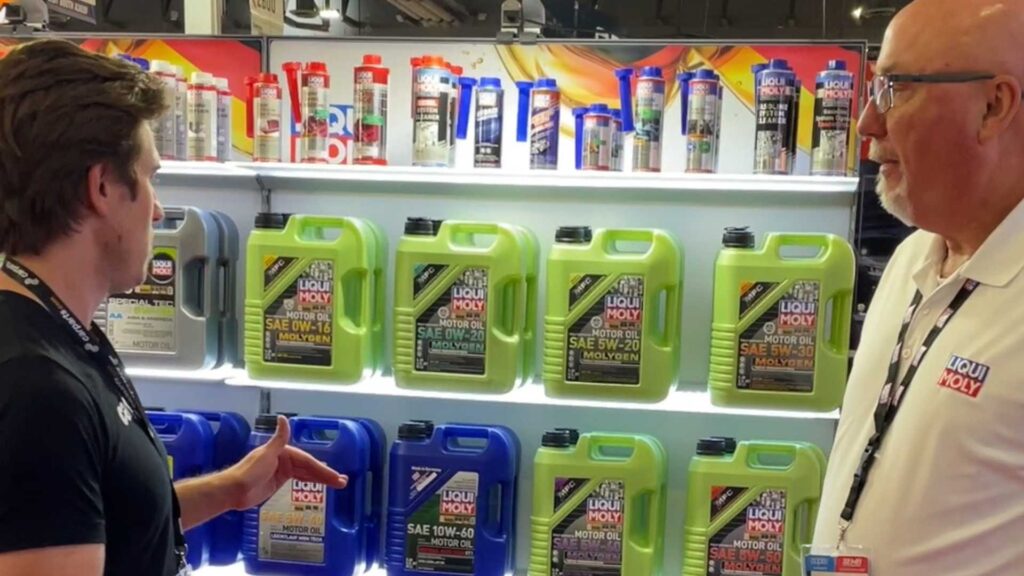Whether you’re a seasoned gearhead or just starting to get your hands greasy, understanding the differences between conventional, synthetic, and blend oils is key to keeping your prized ride in top shape.
We gleaned some golden nuggets of wisdom from the LIQUI MOLY booth at the AAPEX 2023 (the Auto Care Association and Automotive Aftermarket Suppliers Association big show), and we’re here to share them with you in our common pursuit of automotive excellence.
What is LIQUI MOLY? With a selection exceeding 4,000 items from a singular source, they stand as one of the few comprehensive suppliers globally, providing suitable products for every vehicle. Their inventory includes the broadest and most extensive array of motor oils, additives, gear oils, greases, pastes, adhesives, and products dedicated to service and vehicle care.
Would You Prefer Watching the Interview? Click Here
Your Options When It Comes to Oil

Conventional Oil: The Heritage Choice
Tailored for the Classics: Conventional oil, our good old mineral-based friend, is the go-to for vintage beauties. Think of those majestic machines crafted before the 90s.
These oils are in their element here, complementing the engineering of yesteryears. Venturing into synthetic territory with these classics might lead to some unwanted drama like seal leaks – something we want to avoid at all costs.
Synthetic Oil: The Modern Marvel
Geared for the New Age: Synthetic oils are like the high-tech, performance-enhancing gear of the oil world.
Crafted for engines birthed in the late 90s and beyond, they’re a marvel of chemical engineering. Their molecular architecture offers superior protection and endurance, making them indispensable for today’s high-spec engines.
These oils are a non-negotiable for meeting the stringent OE manufacturer standards that our modern mechanical beasts demand.
Conventional Blend: The Best of Both Worlds
Harmonizing Old and New: Semi-synthetic or conventional blend oils strike a fine balance. They blend the nostalgia of mineral oils with a dash of the synthetic wizardry.
While not as prevalent, these blends are perfect for older models that can benefit from a slight bump in oil performance without fully committing to the synthetic route.
Deciphering Ratings & Approvals
The key to oil selection isn’t just about the type but aligning it with your vehicle’s specifications.
Keep an eye out for those API levels, ILSAC ratings, and specific approval codes, like the Long Life 01 FE for BMWs after 2002. These are your roadmap to ensuring your oil choice is in sync with your vehicle’s needs.

Tailoring Oil Choice to Your Driving Style and Environment
Let’s talk about customizing your oil choice to fit not just your vehicle, but also your driving habits, environment, and those unique quirks of your beloved ride. This is where we mix a bit of science with a lot of real-world experience.
Driving Preferences: Are You a Cruiser or a Speedster?
- For the Fast and the Furious: If you’re someone who loves pushing your car to its limits, synthetic oil is your best bet. It’s engineered to withstand high temperatures and pressures, perfect for high-performance driving.
- The Easy Riders: If your driving style is more about leisurely Sunday drives or regular city commutes, a conventional or blended oil might suffice. These oils are great for engines that don’t undergo extreme stress.
Vehicle Type: Not All Engines are Created Equal
- Classic Beauties: For older, classic cars, stick to conventional oil. Their engines were designed in an era before synthetic options and work best with the oil of their time.
- Modern Machines: Newer cars, especially those with turbocharged or high-performance engines, will usually require synthetic oil. It’s not just a recommendation; it’s often a must for these high-tech engines.
Environmental Considerations: Weather & Terrain Matter
- Hot Climates: In warmer regions, synthetic oil is a winner. Its ability to resist thinning at high temperatures means better protection during those scorching summer drives.
- Cold Areas: If you live where the mercury dips low, synthetic oil again proves its worth by flowing more easily at low temperatures, ensuring your engine gets the lubrication it needs from the get-go.
- Rough Terrains: Off-roaders or those frequently driving in challenging conditions should lean towards synthetic oils for their superior protective qualities in demanding environments.
Other Factors: Towing, Mileage, and More
- Heavy-Duty Use: For vehicles used in towing or carrying heavy loads, synthetic oil’s enhanced protective qualities help in coping with the added engine strain.
- High-Mileage Heroes: There are specific high-mileage oils (both synthetic and conventional blends) designed for vehicles over 75,000 miles. They include additives that help reduce oil burn-off and improve engine seal conditions.
Making the Smart Choice
Choosing the right oil isn’t just about what’s under the hood; it’s also about how you use your vehicle and where you drive it. Each type of oil has its niche, and finding the perfect match for your car is like finding the right pair of shoes – it just feels right.
So, consider your driving style, your vehicle’s demands, and the environment it operates in. With this holistic approach, you’re not just pouring oil; you’re providing care tailored to your car’s lifestyle. Drive on with confidence, knowing you’ve made the best choice for your automotive companion!

Any information provided on this Website is for informational purposes only and is not intended to replace consultation with a professional mechanic. The accuracy and timeliness of the information may change from the time of publication.



























In your article for Liqui Moly, did I miss it, or did you not mention the need for added Zinc in motor oils for cars pre-1980?